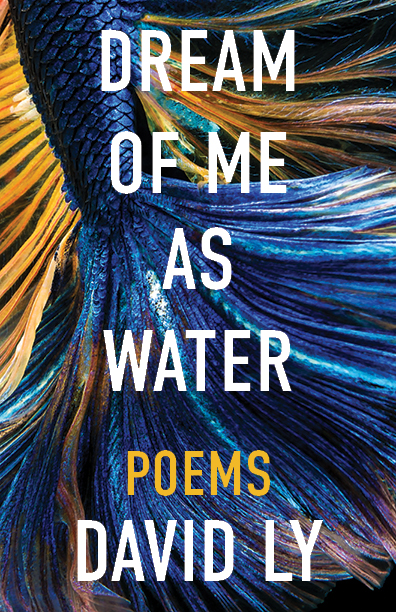
Reading Dream of Me as Water by David Ly is like falling down a rabbit hole and discovering vibrant color and vivid imagination in the depths. An almost Alice in Wonderland-like experience, the book opens the way a drop of ink blooms in water: centered, before it spreads out. From there, Ly takes us from dreamscape to dreamscape, each poem subtly suspending reality at the same time it is very much grounded in it.
Using subtle turns in language, Ly presents the past, present, and future all on the same stage. The poem “Autobiography as a Thunderstorm” opens with the speaker sheltering from a fearsome thunderstorm. Ly sets up the imaginary with an anecdote, writing, “I lie in bed thinking / of my mom mentioning / that my fear of rain / came from a past life / where I died as a soldier / fighting during a storm.” As the poem reflects on these lines and the possibility of the past and present attempting to reckon itself, Ly looks to the future, writing, “memory may not be / generous for a second time / if I carry too much / of myself into the next life.” The reader is constantly invited throughout the poem to suspend belief, to indulge in theories and fantasies, which sets us up to finally feel the emotional impact of the final lines, the tenderness of the speaker trying to spare a future iteration of themselves.
What stands out in the collection is its vulnerable honesty. There are no tricks or mirrors. The image of the poet that emerges out of this collection of poems is one of a young man just trying to figure things out, and it’s a really relatable sentiment for modern young adults. In “To Each Their Own (Arm of a Giant Pacific Octopus),” the arm of a giant octopus breaks off, floats away, and regenerates a whole new being. Inspired by this, the speaker of the poem longs to also be able to break free from himself and become someone new. The poem situates itself in a place many young adults find themselves: on the precipice of growth, needing perhaps a little push to get over the hurdle. The poem is honest, and the poet does not write on the other side of change but rather leans into fear. Ly writes, “How do I heal? / I’m not brave enough / to break away / and flourish by myself.”

Throughout the collection, there are many references to past origins of animals, which at first appear to be part of the dreams that Ly conjures up through the collection. However, upon closer look, these references slowly flesh out into something larger. In the poem “Ask and Answer,” Ly writes, “He asks when the octopus lost its shell and it twirls the end / of an arm, pointing back to the Mesozoic Marine Revolution.” The poems feels like a backwards time-lapse, as we watch the octopus evolve and un-evolve and examine the implications of the change. At first glance, this evolution doesn’t make sense. After all, shells would protect octopuses from predators, ensuring the longevity of the species, yet octopuses evolved and lost their shells. The line “He asks why he needs to learn to be softer” reveals that the octopus evolved to be more vulnerable but in doing so, gained other strengths, and it reveals the desire on the part of the poet to mimic this evolution.
Ly’s genius really shines in the poem “Folklore,” which seemingly tells a folk tale about a boy whose anger gets the best of him. In a show of rage and strength, this boy rips out the tongue of a wolf. In this tale of man versus wolf, we assume that the speaker of the poem is on the side of the boy. After all, both are human and wolves are wolves. At the end of the poem, Ly writes, “I didn’t stop him when he walked / into the forest and waded into the lake, / leaving me to whimper with the wolves,” indicating that the speaker is actually one of the wolves. Moments of disorientation like this lend themselves to this collection, and the reader gets lost among all the images. By the time the collection ends, these images linger in the reader’s mind, allowing the collection to make its lasting impression.
David Ly’s Dream of Me as Water is ultimately a touching read because of how down-to-earth it is. The collection does not pretend to know things it does not know, and takes the reader on a journey to find things out together. As we weave in and out of dreams and travel through the past and present, we uncover truths and even more questions, but we are comforted by Ly’s poetic reassurance that we are all just people, trying to figure it out.
Dream of Me as Water
by David Ly (twitter @dlylyly, instagram @divad.ly)
Anstruther Books, $19.95

Kimberly Nguyen is a Vietnamese-American poet and the author of ghosts in the stalks and Here I Am Burn Me.She is originally from Omaha, Nebraska but currently living in New York City. She is a graduate of Vassar College where she holds a degree in both English and Russian Studies. Additionally, she studied abroad at the University of Exeter in the United Kingdom. She is a recipient of the Beatrice Daw Brown Prize for excellence in poetry and two Best of the Net nominations, and she was a finalist for Kundiman’s 2021 Mentorship Lab and the Asian American Writer’s Workshop 2022 Margins Fellowship. She was a 2021 Emerging Voices Fellow at PEN America and is currently a Poetry Coalition Fellow .


